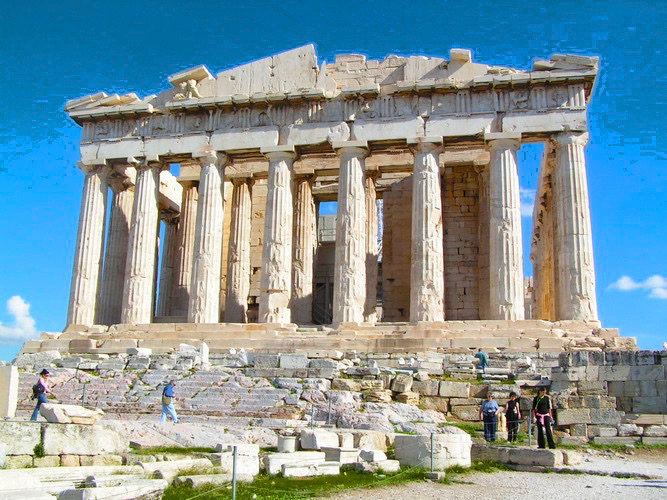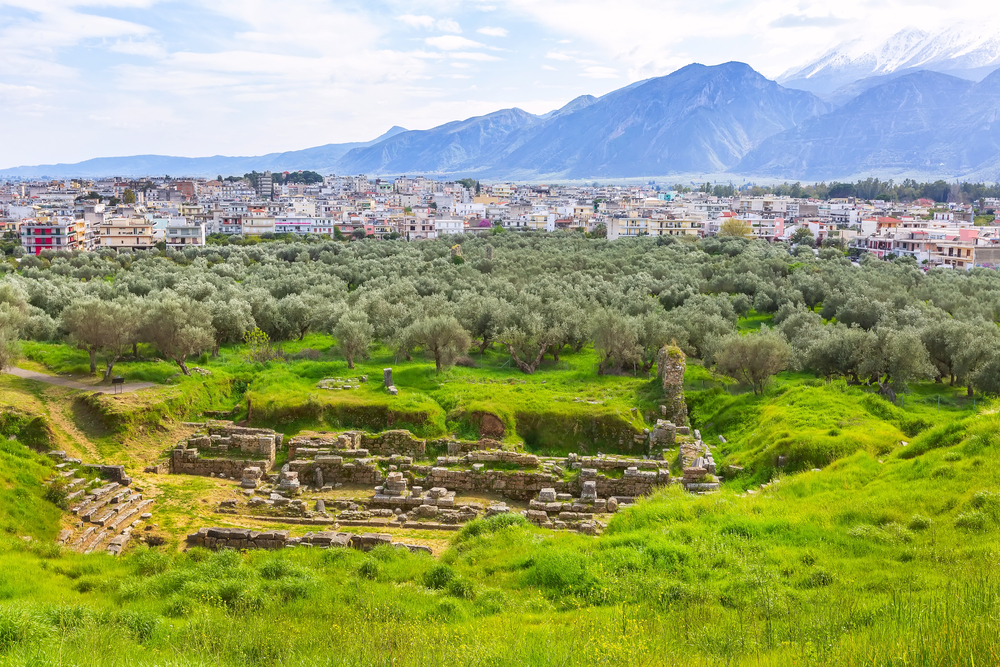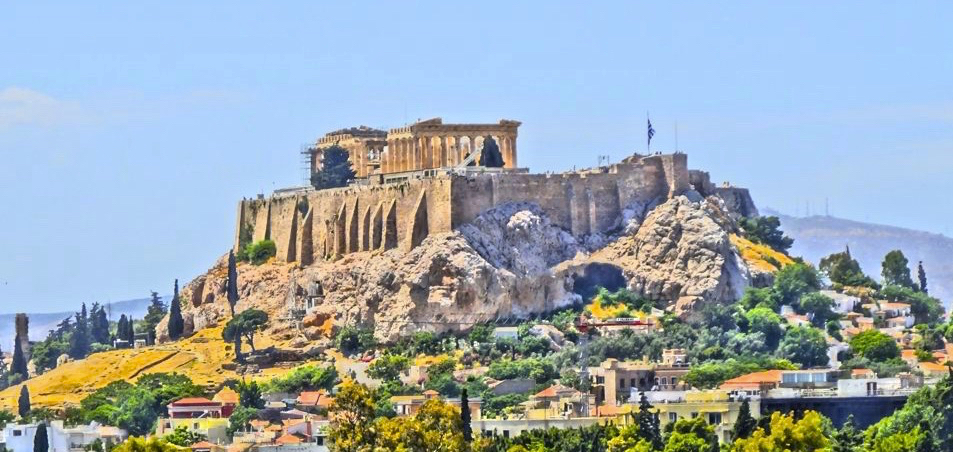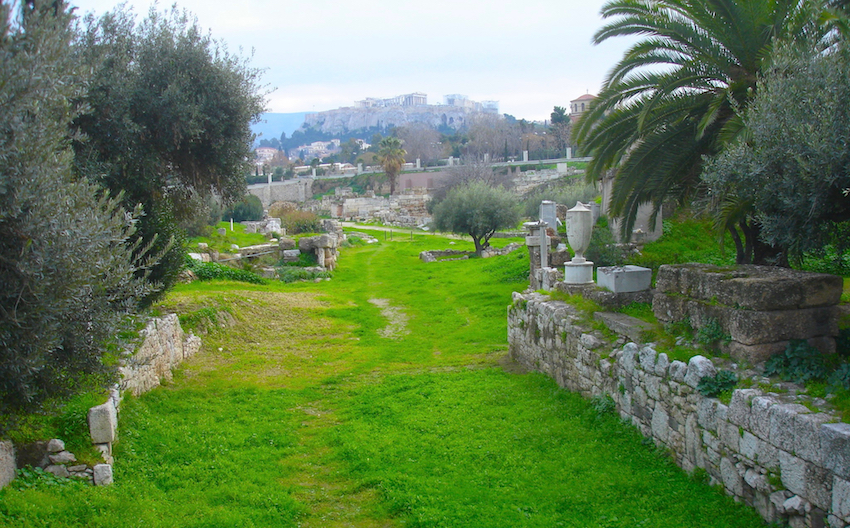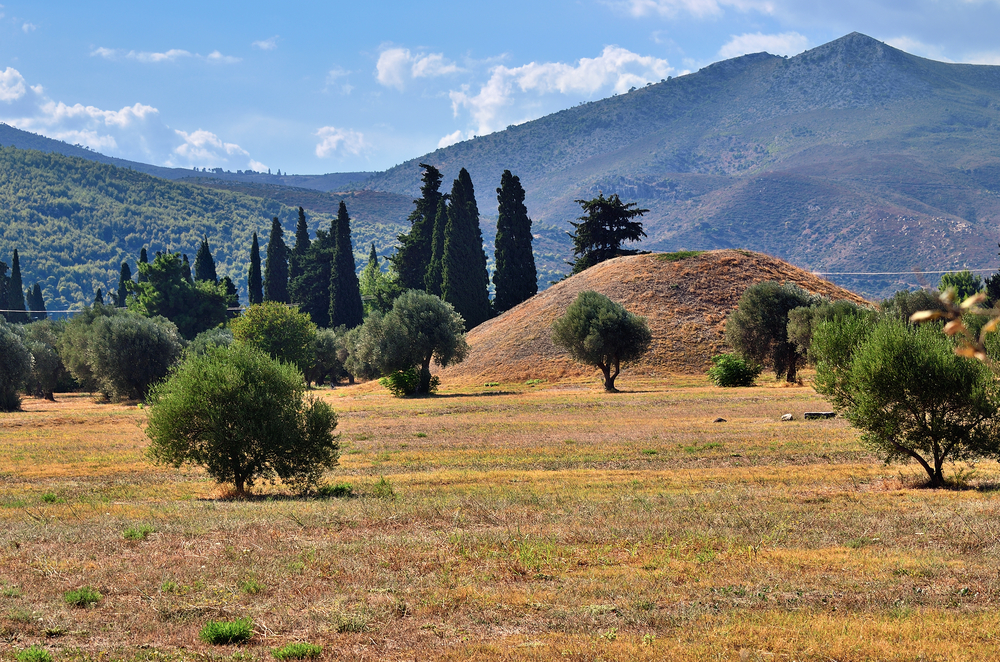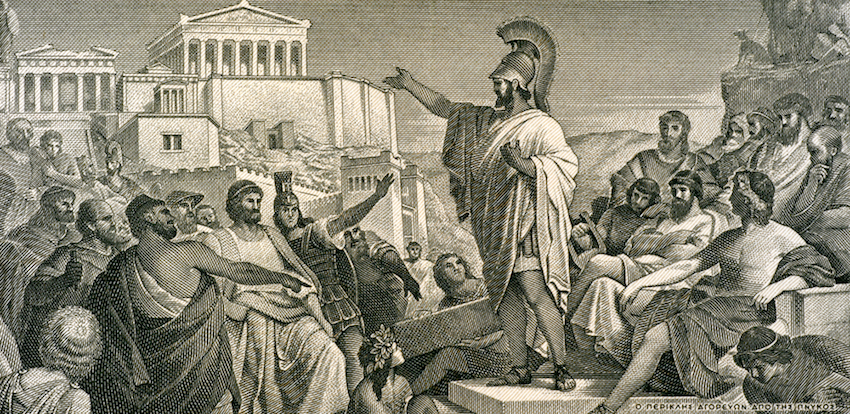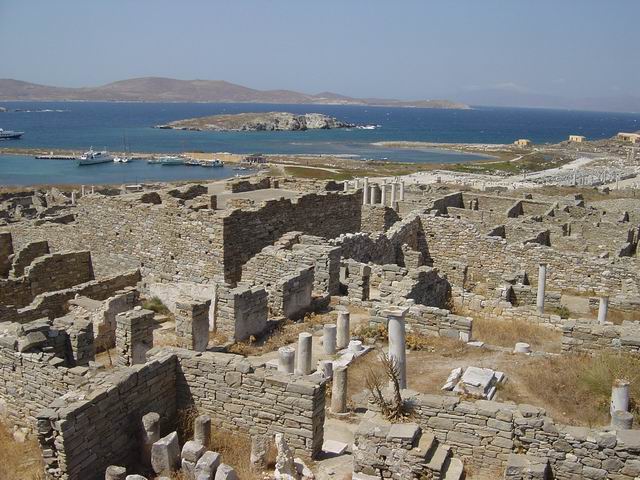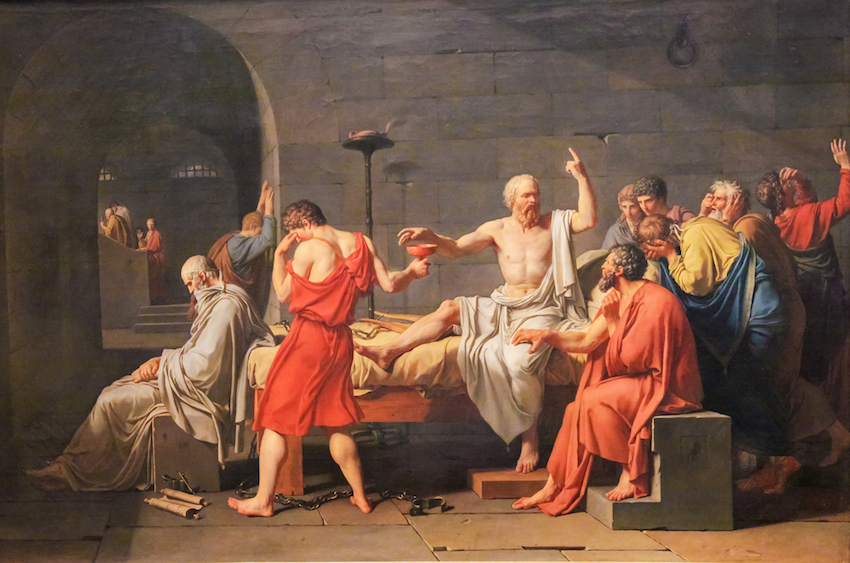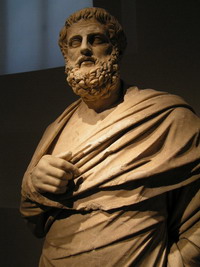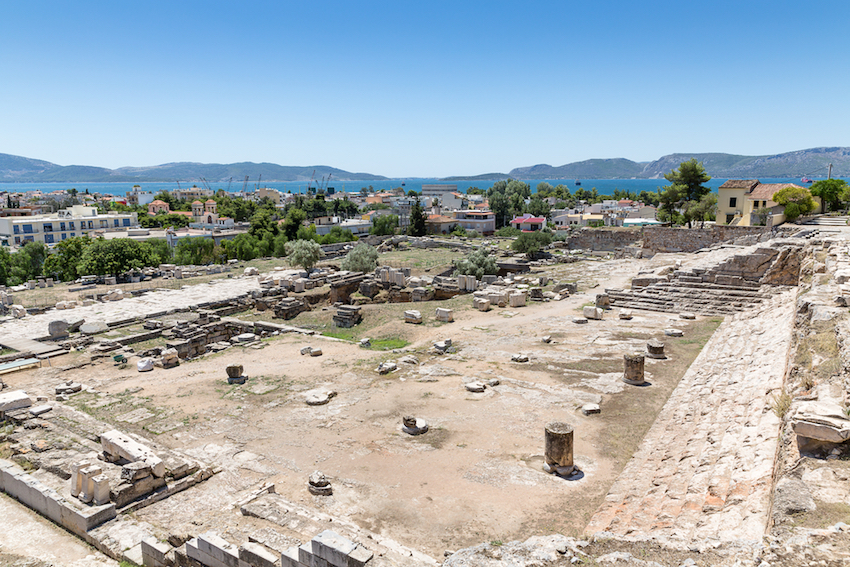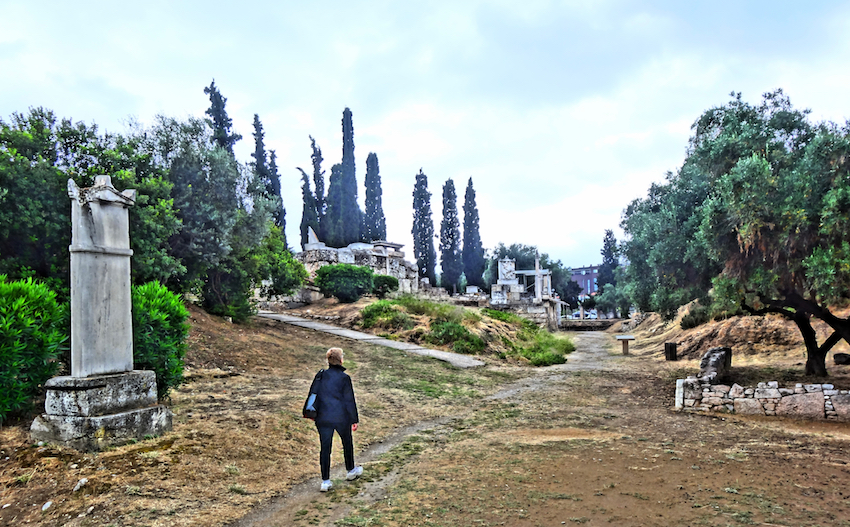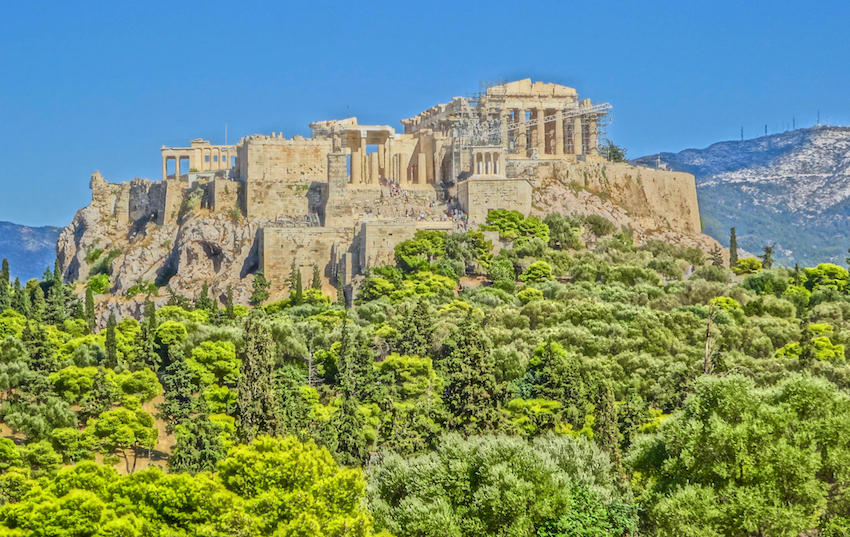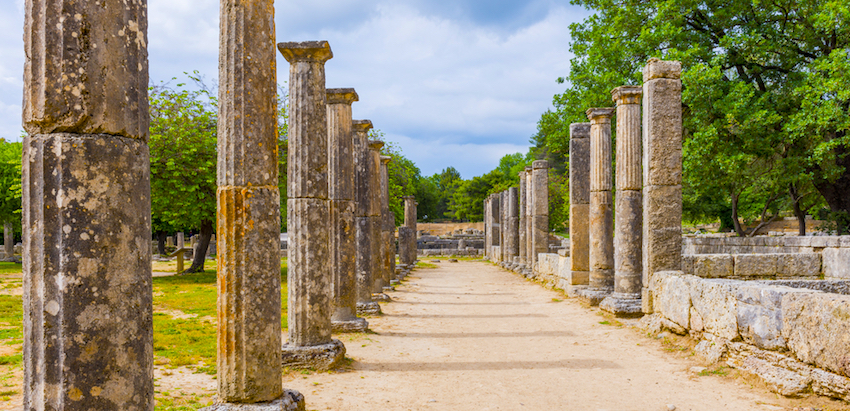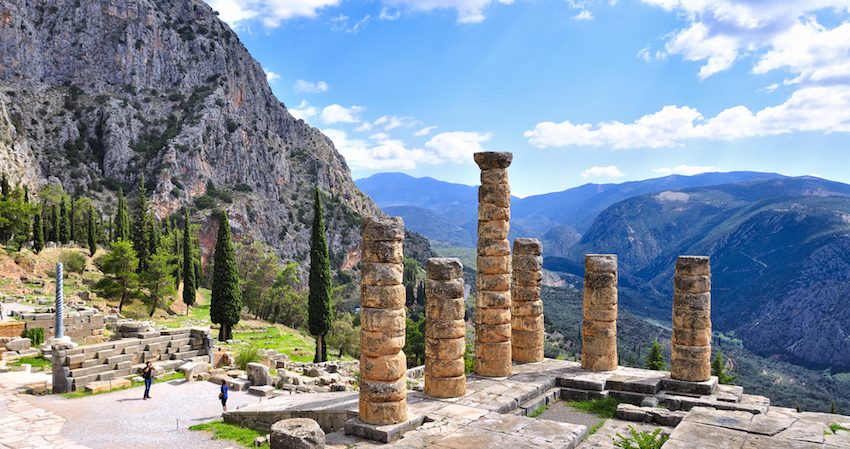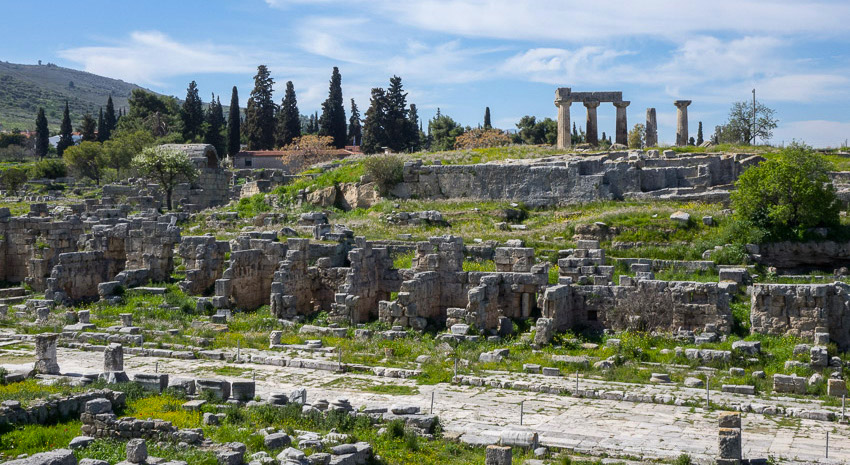
History of Greece
The Golden Age of Greece
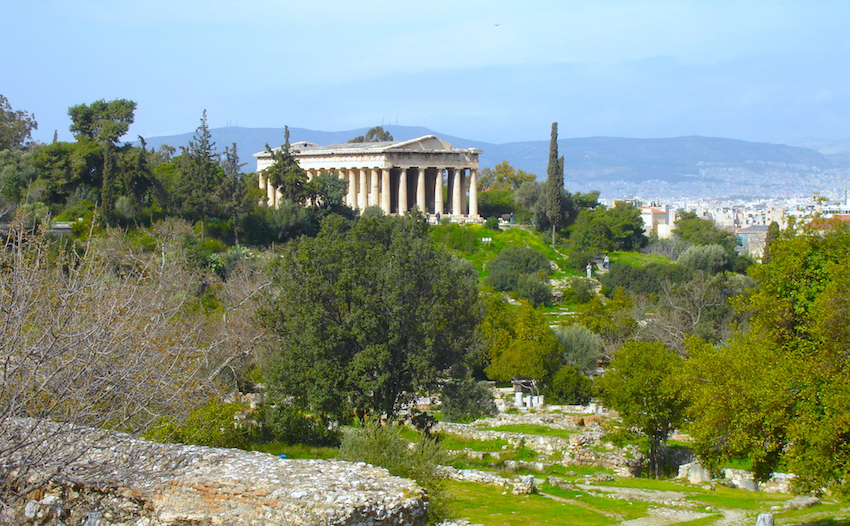
|
The Classical Period or Golden Age of Greece, from around 500 to 300 BC, has given us the great monuments, art, philosophy, architecture and literature which are the building blocks of our own civilization. |
|
The seeds of the classical period were sown in the 8th century with the committing to writing of the works of Homer, the Illiad and the Odyssey, which in a way created a code of conduct and an ethnic identity for the Greeks. The heroic exploits of Odysseus, Achilles and the other Achaeans served as role models for the Greeks which told them how to behave, (and in some cases, how not to behave) in many situations, particularly on the field of battle and in competition. Just as important in the creating of a Greek identity was the emergence of the Olympic games and the Oracle of Apollo at Delphi both of which had their roots in the 8th century. |
|
|
The SpartansThe Spartans who were founded by Lycurgus around 800 BC were known for their militaristic society. These Spartans, known as the Lacedemonians controlled the Peloponnesos. The Spartans had not always lived in such a society. Earlier in their history they had produced art, poetry and music and seemed to be on the same course as the rest of Greek civilization which might have led them to give us some of the famous names that have been passed down through history. But from the late 8th Century Sparta fought a war with their neighbors in Messinia to the west and unlike other wars in ancient Greece where an invading army fought, won, worked out a treaty and left (to fight again someday), the Spartans subjugated the entire population of Messinia, reducing them to slaves or helots. These helots were no more than serfs and worked the land for the Spartans. Because the helots vastly outnumbered them, the Spartans had to create a society that would protect themselves not just from external enemies but from a helot revolt from within. Men lived in barracks and male children were taken from their mothers at a young age to learn how to serve the state, meaning the art of warfare. Unhealthy children were killed or left to die. Life had one purpose. To defend the state. The Spartan Constitution was credited to Lycurgus who in his travels had studied governments in Crete and Ionia, had read the epics of Homer which strongly influenced his ideas on how a nation should be run. Lycurgus traveled to Delphi for guidance. Told by the Oracle that his laws would make Sparta famous, he returned to convince first his influential friends and eventually all the Spartans that his reforms will bring power and glory to Sparta. The system of government he created included two Kings, five ephors (executives), a council of thirty elders and a general assembly which was made up of all male citizens. Full citizenship was reserved for the elite, known as the Spartiates who spent much of their time training for and fighting in wars, while their helots worked the land to provide food for the communal mess halls known as syssitia. This is where the Spartiates ate their meals and each was expected to contribute a certain quota of produce every month. Those who could not keep up with their commitment were kicked out and became part of the inferior classes. Children served and then listened to the men discuss state affairs and other topics, as part of their education. Girls were required to exercise and be strong so that they would give birth to strong men. They were also required to dance naked in front of the men to teach them bravery and to be too ashamed to let themselves get fat. The boys learned to read and write but their primary educational goal was to learn to be brave and strong. Maybe the most frightening of the Spartan institutions were the Crypteia, where young boys were sent to the countryside to live off the land similar to 'Outward Bound' except for a critical difference. These boys were permitted to kill any helot they ran into. This pretty much kept the helots at home. The Spartans not only feared their own subjugated population but they also feared ideas (like democracy for instance) entering and polluting their system. They would occasionally expel all foreigners and they discouraged commerce and trade by banning ownership of silver and gold, instead using heavy iron coins which were then dipped in vinegar to make brittle. This eliminated the import of luxury items, robbery, bribery, prostitution, jewelry and the amassing of property and resulted in a society where it was impossible to get richer than your neighbor, creating equality, among the Spartan elite anyway. Though it is easy to get the impression that the Spartans were a society of militaristic robots this is not the case. The Spartans were known for their wit and their ability to say a lot without wasting words. Because the helots did all the work the Spartans had plenty of time for leisure and it is a myth that they spent every free moment in training. Nonetheless much of their time was spent in training in the art of war and discipline and their soldiers were feared by all their enemies and even some of their 'friends'. Marching into battle to the sound of flutes and inspirational music, the Spartans seemed to be completely comfortable and at ease which of course made their adversary uncomfortable and uneasy. They used mercy as a tactic as well. The Spartans would not pursue and slaughter a retreating enemy, considering such behavior disgraceful and not befitting a true warrior. This gave their adversaries the option of not fighting to the death but turning around and running and living to fight another day. It was a policy of Lycurgus not to fight too many wars with the same opponent since that gives him a chance to learn your style and strategies and defeat you. In his final act as leader, Lycurgus informed the Spartans that there was one thing more that had to be done and that he needed to go to Delphi to ask the Oracle how best to implement this final piece of the puzzle. He made the Kings and the people of Sparta take an oath that they would not change any of his laws until he returned. He left the city and disappeared forever. |
|
|
The AtheniansThe primary rivals of the Spartans were the Athenians who were founded by Theseus around 1300. Theseus was from the city of Troezen across from the Saronic Island of Poros and was said to have been born in the union of Aegus, king of Athens, and the daughter of Troezen's King. At the age of sixteen Theseus was given the task of lifting the heavy stone where his father had put a sword and sandals. Successful in his efforts he walked to Athens to find his father, defeating monsters and evil along the way. After arriving in Athens as a hero he volunteers to go to Crete where King Minos has been demanding a sacrifice of young men and virgins to a monster called the Minotaur. Theseus defeats the Minotaur and returns to Athens though he forgets to remove the black sail of death from the ship. His father, King Aegeus, thinking his beloved son has died, hurls himself into the sea, which is how it came to be known as the Aegean. Upon Theseus' return he abolishes the monarchy and declares Athens a democracy and unifies the scattered villages of Attica. He makes it a policy to give aid to the weak and helpless. His exploits also include adventures with Hercules, Jason and the Argonauts, the Amazons and even a journey to the underworld. Later he was overthrown and then murdered while exiled on the island of Skyros. Whether fact or fiction, the meaning behind these stories is what is important to the Athenians. Theseus embodies all they stand for. The Athenians of the 5th Century used his deeds as the standards to measure themselves and their democracy. Theseus was to the Athenians what George Washington is to Americans today. The Athenian democracy was reformed by King Solon in 594. Solon was to Athens what Lycurgus was to Sparta and his reforms paved the way out of a volatile period and into the Golden Age. The 6th Century was a time of social strife and to keep society from falling apart the Athenians elected Solon, a poet and statesman, to mediate between the various groups that were in conflict and to reform the system of economics in Athenian society, where there was an enormous difference between those who were well off and those who were not. Under Athenian law if you could not pay your debt, the person you owed money to could seize you and your family and sell you as slaves to get his money back. Solon's economic program was called the seisachteia or the 'shaking off of burdens' because it released the lower classes from the burden of debt to those in the wealthy classes. By canceling and reducing debts and abolishing a system of mortgage which had turned many poor land owners into slaves, Solon made a more level playing field. Solon wanted even the poor to take part in Athenian government and He formalized the rights and privileges of the four social classes whose access to public office now depended on how much property they had instead of by birth. The lowest class was called the thetes (laborers) who could take part in the general assembly but they could not run for office. The other economic groups from the bottom up were the Zeugitai (Yeomen), Hippeis (Knights) and the Pentakosiomedimnoi (Those with over 500 measures of wet and dry produce). The economic reforms that Solon enacted led to the future prosperity of Athens. He banned the export of all agricultural products with the exception of olive oil, which was as valuable to the ancient Greeks as it is to the modern Greeks. By offering citizenship he attracted some of the finest craftsmen of the Greek world to Athens. He discarded the Athenians system of weights and measures in favor of the system used in Evia which was in wider use, enabling the Athenians to more easily trade with the other Greeks in the Aegean. He made being unemployed a crime. He created a supreme court made up of former Archons (ruler or chief magistrate) of Athens and another legislative body of 400 to debate laws before putting them before the people for a vote. Though Solon's reforms did not cure the ills of Athenian society overnight in the way that Lycurgus had done with the Spartans, the long term effect was to solidify the rule of law and eventually led to Athenian democracy. After committing these laws to writing Solon left Athens because he did not want to be bothered by the Athenians who would be continuously asking him to interpret his laws. He wanted to let them figure it out and he went off to Egypt where he started but never finished a story about Atlantis, which he had learned about from the Egyptian priests. After he left, the Athenians began fighting amongst themselves again and for two years the city was a leaderless anarchy. (The word anarchy comes from the Greek, meaning without a leader or archon.) |
|
|
The TyrantsAthenian politics was comprised of three groups which corresponded to the different areas of the Attica peninsula. The three groups were the Men of the Shore, the Men of the Plain and the Men from Beyond the Hills. In 561 Pisistratus, the leader of the Beyond the Hills faction from eastern Attica and a remarkable orator, showed up in the agora with his clothes ripped and bleeding and told the Athenians he had been attacked by his enemies. He was given permission to protect himself with bodyguards. With these men he seized the Acropolis and tried to make himself ruler. He was driven out. Three years later he tried again by marrying a young girl from another leading aristocratic family but she left him for not fulfilling his matrimonial duties and Pisistratus left for Thrace where he focused on amassing more wealth by digging for silver and gold. In 546 he returned with his riches and a six foot tall woman who he dressed up as the Goddess Athena and had her drive him into Athens on a chariot. Apparently this worked because his followers defeated his opponents at the Battle of Palini and Psistratus became the ruler of Athens. Though the word tyrant in our culture brings up images of Nazis, secret police and torture chambers it actually means a leader who was not restrained by law or constitution, nor was he elected, chosen or born into power. So in other words it did not mean he was a bad guy. It just meant he could do whatever he wanted because there was nothing above or below that could stop him. The period of Athenian history under Pisitratus was one of peace and his rule was a positive step in the establishment of democracy, perhaps more so than Solon. It was under his rule that the Dionysian and Panathenaic Festivals turned Athens into the cultural center of the Greek world while the sculpture, and pottery of this period raised the bar to a new level. By establishing relations with other Greek tyrants and annexing the island of Delos and its sanctuary of Apollo he created prosperity as well as a sense of Athenian identity that brought the people of the city together and an end to the in-fighting which had been the cause of so much stasis (stagnation). Unfortunately his sons, who assumed power after his death in 528 were not quite up to the task and were tyrants in the sense of the word that we are familiar. Hipparchus was assassinated in 514 and Hippias was expelled from Athens in 514, returning in 490 BC when the Persians (unsuccessfully) invaded Attica. After another period of instability following the expulsion of Hippias, two aristocratic leaders, Cleisthenes and Isagoras, emerge as the leading contenders for rulership of Athens in 510. When Isagoras calls on the Spartans to help him assume power and banish the family of Cleisthenes, the Athenians reject the outside interference and Isagoras himself. Cleisthenes becomes archon. He redraws the political map of Athens in a way that breaks the power of the old aristocracy and gives all the Athenian people a voice in politics. His reforms include the annual rotation of power (so no single group or person could become dominant) and the splitting up of the four tribes of Athens into ten new tribes which were then broken up into smaller demes (municipalities) which were then spread around so that it was more difficult for the old families to organize into a political faction. The Athenians embrace this and identify strongly with their deme to such a degree that when asked his name he would give his first name, the name of his father and his deme. (So I would be Matt, son of Nicholas of Kalithea). Read more on Athenian Democracy... |
|
|
The Persian WarsIt is this sense of identity as an Athenian, combined with that of being Greek, which gave the people of Athens a feeling of superiority. As anyone who watches sports knows, believing in yourself can be the most important factor when facing a superior opponent. When the Persian empire expanded to encompass the Ionian Greek city states in Asia Minor they decided to punish the Athenians for sending a contingent during the rebellion that burned the city of Sardis in 498. It was the classic David vs Goliath scenario. (Just imagine the US declaring war and invading Costa Rica). An expedition sent by the Persian King Darius landed on the coast at Marathon, just 26 miles from Athens where they were defeated by the Athenian army. When a herald named Phidippides runs the 26 miles from Marathon to Athens to announce the Greek victory and dies on the spot, an event which may or may not have happened, we have the origin to the marathon races which are now run all over the world. (That's why they are 26 miles. The distance from Marathon to the center of Athens). Those who fought at Marathon are treated as heroes for the rest of their lives. It also added to the Athenian mystique and the feeling that they are superior and can not be beaten. Almost twenty years later King Darius died and his son Xerxes mounted another attack on Athens, this time with overwhelming force by land and sea, planning to conquer and annex all of Greece. In the years following the battle of Marathon the Athenian statesman Themistocles had convinced the Athenians to use the silver which had been discovered in Lavrion, to build a fleet in order to fight the Greek state on the island of Aegina, which was so close it could be seen from the Acropolis. As the Persians advanced this Athenian fleet was sent north where they fought an inconclusive battle with the Persian fleet at Artemisium. On land the Greeks could not agree on the best way to fight the Persians. Their first defense at Tempe was abandoned and there were plans to fall back as far as the Peloponessos and make their last stand there. A Spartan King named Leonidas wa sent with his Royal Guard of 300 men to delay the Persians at a narrow pass at Thermopylae where they held out for three days before being overwhelmed and killed. The epitaph of the heroic Spartans was written by the poet Simonides and carved in the stone walls of the pass: Tell them in Lacedaemon passerby As the Persians continued their relentless march south towards Athens, the Greek fleet lures the Persian fleet into the straits between Attica and the island of Salamis where their smaller and more maneuverable ships have an advantage. As Xerxes watches from a hill the Greeks sink 200 Persian ships, capture some and the rest flee. Xerxes and his army retreat north where they wait through the winter and return in the summer of 479 to burn and sack Athens. The Greeks are now one hundred thousand strong, commanded by the Spartan General Pausanias and reinforced by other Greek city-states which have entered the war sensing a Greek victory. They defeat the Persian army in the battle of Plataea while the Greek's navy destroys the Persian fleet at Mykale off the coast of Asia Minor. This is the end of the Persian wars and the beginning of the end of the Persian empire. Had the Persians won and occupied Greece, western civilization as we know it might not have occurred. What did occur is a feeling among the Greeks that because they had defeated a larger and more powerful enemy, the Persians must be somehow weak, effeminate and inferior to them. It creates a sense among the Greeks that they are meant to live free from outside influences and the word for freedom: eleftheria, becomes an important idea which it has remained even to this day. It also is the beginning of the split between east and west and the word barbarian which had meant speaking an incomprehensible language, now came to mean uncivilized or inferior. In 476 the Athenian general and statesman Cimon travels to the island of Skyros where he finds the bones of Theseus, brings them back and builds a shrine to the great king who had not only been an inspiration to them but who had been seen fighting alongside the Greek soldiers in the battle of Marathon. |
|
|
The Age of PericlesWith the threat from the east gone Athens begins a fifty year period under the brilliant statesman Pericles (495-429 BC) during which time the Parthenon was built on the Acropolis and the city becomes the artistic, cultural and intellectual as well as commercial center of the Hellenic world, attracting all sorts of smart and interesting people and taking command of the other Greek states. Continuing their war against the Persians they liberate the Ionian Greek cities of Asia Minor and the Aegean islands.
|
|
|
Greek Philosophy, Theater and HistoriansAmong the dwellers of Athens during its Golden Age is the philosopher Socrates. Though he left no writings of his own, he is mostly known through the work of his student Plato in the form of written dialogues which are conversations with other learned and un-learned men on a variety of topics. The 'Socratic method' consists of asking questions until you arrive at the essence of a subject, (or sometimes not) by a negative method of hypotheses elimination, where the better hypotheses are found by identifying and eliminating the ones that lead to contradictions. His philosophy begins with the belief that he knows nothing and that life is not for attaining riches but a process of knowing oneself. He believed that virtue was the most valuable of all possessions and that the job of a philosopher was to point out to people how little they actually knew. He was executed by the state, forced to drink hemlock, for corrupting the youth of the city. Oddly, more members of the jury voted to give him the death sentence than originally voted that he was guilty. In other words some who thought he was innocent still voted to have him executed, pointing out early problems of democracy that are still with us today, (that people are either stupid or not paying attention.) Plato became an opponent of the Athenian-style democracy, probably because any society that would condemn someone like Socrates to death had to be insane. He believed that society should be governed by governor kings, or benevolent dictators, educated and trained from the beginning of life for this purpose. He went on to open the world's first university, the Academy, the ruins of which can still be seen in Athens. Plato was an idealist. He believed in a higher reality of which the material world is just a manifestation. It is said that all philosophy is just a footnote to Plato. His student and then fellow philosopher Aristotle was more of a materialist and he believed in putting everything in categories and was the inventor of logic. He opened his own school the Lyceum and went on to become the tutor of Alexander The Great. He is considered the father of European thought, though some of his scientific observations were simply wrong. |
|
Music in Ancient Greece was seen as something magical, a system of pitch and rhythm ruled by the same mathematical laws that govern the universe and capable of changing the heart and soul of humans. This was known as the 'Doctrine of Ethos' and as an art form it was humanistic, as was poetry, drama, sculpture and the other art of ancient Greece. It was the rediscovery of the ancient Greek view that music should move the heart and soul which led to the science of harmony in the early Renaissance and gave us the music that we are familiar with today, just as the rediscovery of the other aspects of classical Greece inspired the artists, poets, writers, philosophers and architects of the 15th and 16th Centuries. When you read that the ancient Greeks gave us our culture this is what they meant. The Renaissance was a re-discovery of what was going on in 4th century Athens and emancipated European culture from the dark ages. |
|
|
Greek ReligionReligion was an important part of Greek society and they believed in a polytheistic system, a belief in many Gods. These Gods lived on Mount Olympus, led by Zeus, whose job was to keep all the other Gods in line, a difficult task, considering that he was one of the most unruly, coming to earth in various forms to seduce immortals and mortals alike. His sister Hera was also his wife and was the protector of women and the family. Ares was the God of war. Haephestus was the God of craftsmen and created the first women, Pandora, as a punishment for man. Her box unleashed all the evils that were to afflict mankind. Aphrodite was the beautiful Goddess of love and lust, punished by Zeus and forced to marry the unattractive Hephaestus. Demeter was the goddess of the fertility of the earth and the harvest who was celebrated in the ancient mysteries of Eleusis. Athena was the Goddess of Wisdom and the patron of Athens. Poseidon (photo) was the God of the sea, a brother of Zeus and a moody individual who caused storms, floods, earthquakes and volcanic eruptions. Apollo was the God of the sun who daily drove his chariot through the sky. He was also the God of light, both physical and spiritual. Artemis was the Goddess of childbirth and the protector of young animals. Hermes was the God of commerce, wealth, and oratory and was also known as the messenger of the Gods. Today he is the symbol of the Greek postal system. Dionysus was the God of wine and song. Asclepius was the God of healing, Eros the God of Love, Hypnos the God of sleep and Pan was the God of shepherds. The most important part of the ancient Greek religion was the act of sacrifice. Though we often think of the Greek temple as being the center of the ancient Greek religion it is actually the alter which was the most important. Sacrifices were held at festivals devoted to the God where animals were slaughtered and cooked, their rising smoke was the offering. |
|
|
|
The most important of the festivals in Athens was the Panathenaea. All the inhabitants would meet at the Dipylon gate, walking the road known as the Sacred Way up to the Acropolis where sometimes hundreds of cattle were slaughtered on the alter of Athena which must have created rivers of blood. There were seasonal festivals for the harvest and grape-picking among others as well as astronomical festivals. A ritual known as Apatouria was a rite of passage for young men going from adolescence to adulthood. They are introduced to the fellow demesmen of their fathers and the initiates name is inscribed on the roll of Athenian citizenship. The girls had a ceremony that took place in the coastal town of Bauron where at the age of 12 or so they passed into womanhood in a festival dedicated to the Goddess Artemis. A ritual to ward off evil in the home was called the Anthesteria and was performed at the same time by everyone in the city. The Mystery cults like that of Demeter at Elefsis had its origins in the dark ages. Initiates may have taken psychedelics to induce a religious experience and create a sense of awe and a sense of the divine. There were also many shrines in Greece where one could supposedly have direct contact with the gods, similar to the experience at Delphi. Though later on Christianity claimed that pagan religion failed because it did not address the inner need of humans, this seems to not be the case. For the ancient Greeks their religion and faith was a highly personal matter which did spring from a sense of awe, based on experience. If one is to believe the accounts of this period it seems possible that the Greeks did talk to the Gods and the Gods talked back. |
|
|
The Peloponnesian WarThe ancient Hellenes often fought each other and the period is a series of wars and changing alliances. It was the Peloponnesian war which finally brought down Athens. The historian Thucydides has written an eye-witness account that goes into great detail and is a fascinating window on what the ancient Greeks said, and thought and how and why they fought. The cause of the Peloponnesian War (from 431 to 404 BC) had to do mainly with Sparta's fear of the expansion of Athens. This and the plague finally brought down Athens, along with an unhealthy dose of Athenian arrogance that usually comes with power, particularly after the death of Pericles in 430 and the rise of the next generation of Athenian leaders who were unscrupulous and hungry for power. In one well known incident the island of Milos did not join the Athenian league and so was given the choice of paying tribute or being destroyed. These negotiations, written about by Thucydides, had the people of Milos taking the point of view that by trusting in God and having faith in human decency they would be spared. The Athenian's point of view was that 'might makes right' and because they were powerful they could do whatever they wanted including wipe out the people of Milos, which they did in 416 BC. The men were massacred and the women and children were made into slaves. Five hundred Athenians were sent to the island to re-colonize it. It was the beginning of the end for the Athenians as well. The massacre of the Melian's exposed the Athenians as ruthless imperialists and turned the ancient world against her in a way that seems to mirror events of our own times. It is the ill-fated invasion of Sicily in 415 that finally brings down the Athenians. Alcibiadis claims passionately that they can easily defeat the enemy and that they will be welcomed as liberators by the Sicilians. Despite the apprehensions, the Athenians are convinced that this is an opportunity to defeat the Spartans and their allies and rally to the cause. But they are victims of poor intelligence or perhaps over-zealous leadership and find themselves with fewer allies and a larger and more organized enemy then they had planned on. Rather than withdraw they decide to escalate (or as we might say now surge). It was a disaster. The Athenian fleet is destroyed by the Syracusians. Athenian troops watch in horror realizing their escape is cut off. They are then defeated and sold into slavery. With the Athenian army and navy gone the Spartans are able to march right into Athens, suspend the democracy and install a pro-Spartan oligarchy known as 'The Thirty'. After a period of civil war The Thirty are overthrown and democracy is restored. What follows is a period of decline in the 4th century where though Athens is not the great power it was, it is still capable of producing the most important developments in philosophy, drama, art and literature. The Hellenes of the Golden age, when threatened by an external enemy were capable of coming together and performing miracles. This is true all the way to the present time as is the sad fact that when there was no external threat they were their own worst enemy and throughout history have fought amongst themselves, sometimes turning what could have been great victories into sad defeats or chaos. |
|
|
The OlympicsFrom 776 BC through the Golden Age until they were finally banned by the Roman Emperor Theodosius in 393, every 4 years men from all over the Greek world came to the town of Olympia to compete in the Olympic Games. Though there were other games in classical Greece, the Olympics were the most important. During the period of the games a sacred truce was in effect so competitors could go through hostile territories to get to Olympia. The games were held on the second full moon of the summer solstice and was not restricted to athletic events. There were also feasts, competitions between orators, poets, prayers and sacrifices since it was in actuality a religious festival dedicated to Zeus for his enjoyment as well as for the Greek love of competition and the Homeric value of arete or excellence which was perhaps the most important quality of the Greek heroes of the Illiad. Athletic fanaticism is yet another gift of the ancient Greeks and by the 2nd century even the priests in Jerusalem were spending more time practicing the discus then they were on their priestly duties. The Olympic and other pan-Hellenic games were open only to Greeks and one's Greekness was confirmed by his inclusion in the games. By the definition of Herodotus to be a Greek meant to share blood, language, religion and customs. But eventually to be considered a Greek meant to live and act as a Greek particularly by engaging in competition with other Greeks. Those who competed were not after riches and lucrative endorsement contracts but for undying glory or cleos aphthiton for themselves, their families and their community. Their victories were turned to prose by poets like Pindar so that even today we know their names and exploits. While the Greeks who competed at these games did not see themselves as a nation they did see themselves as a culture united in language, blood, religion and especially the spirit of Homeric competitiveness as they cheered on the athletes who modeled themselves on Homer's heroes. For more on the 2004 Olympics see www.greecetravel.com/2004olympics |
|
|
The Oracle at DelphiDelphi was believed to be the center of the Universe, not just another holy site or shrine, but the place where the physical world and the spiritual worlds met. Like the Olympics the oracle of Apollo was open only to Greeks. In the 4th Century the Sanctuary of Apollo at Delphi was at its height of popularity as pilgrims, poets, politicians and kings all sought the advice of the Oracle, said to be the voice of Apollo. Leaders wanting to know if this was the time to go to war asked the Oracle. Many times the answer was vague and open to interpretation. The way it worked was a priestess of Apollo, called a pythia, would enter a trance after breathing fumes that came through a hole in the earth. She would then speak in riddles and the priests would interpret what she was saying. Cities would bring offerings and great wealth was built up in Delphi. As the Greek world grew, Delphi, which was a separate entity with allegiance to no particular city-state, became a mediator in disputes between the city-states and Greek colonies. Delphi shaped policies, settled border disputes and authorised the founding of new colonies. Because of the competitive nature of the Greeks disputes were common not only among the individuals but communities and city-states too. The Oracle at Delphi kept everything together in the Greek world and its importance can not be underestimated. The Delphic Games like the Olympic games harnessed the competitive spirit of the Greeks and helped create and sustain an ethnic and cultural identity which two thousand years later became a national (and international) identity. Later a series of wars which broke out over control of Delphi called The Sacred Wars and eventually like the Olympics the Delphic games and the Oracle were outlawed by the Roman Emperor Theodocious as were the rest of the pagan sanctuaries. Some say the spirit of Apollo has never left but the ability to hear him has gone. See www.greecetravel.com/delphi |
|
|
The 4th CenturyFrom 396 to 387 BC the Greek states were in revolt against Sparta. Led by Corinth, and fueled with funds that came from Persia to keep the Greeks fighting amongst themselves peace finally comes to all the Greek states for the first time in what is known as the Peace of Antalcidas. In 398 the Athenians reform the Delian league and once again becomes the leading power in the Aegean world. In 371 the Thebans defeat the Spartans in the Battle of Leuctra. Sparta is then invaded and the Messinian helots emancipated. Hemmed in on all sides, Sparta will never again be the power it had been. Thebes under Epaminondas becomes the most powerful city-state though not powerful enough to unite the others. Much of this period is witnessed by the soldier-writer Xenofon. In 4th Century Athens sculpturers like Scopas and Lysippus are exploring the beauty of the human form. The playwright Menandor has introduced a style of drama known as New Comedy which might be compared to what we know as situation comedy. Aristotle is busy collecting data on everything to develop his theories of the visible world while Plato is focusing on the spiritual with his theory of forms, which will influence Christian mysticism. Meanwhile the speeches of Demosthenes and his rival Aeschines are asking the critical question of the time, how to deal with the rising power of Phillip of Macedon. |
|
Help Support Matt's Greece Guides Join Matt Barrett's Greece Travel Guides Group on Facebook for comments, photos and other fun stuff. If you enjoy this website please share it with your friends on Facebook and other social media. |
